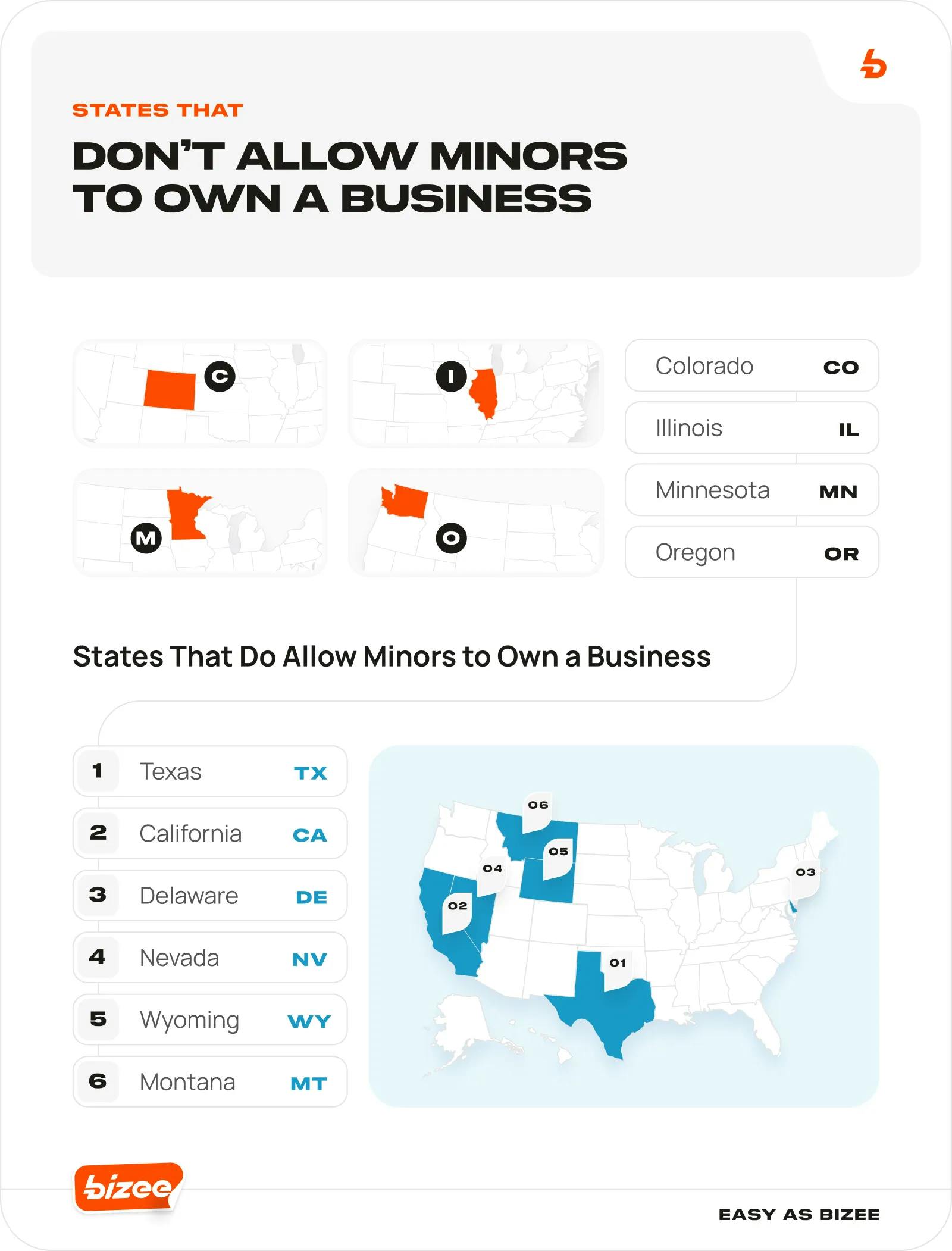Please note: This post contains affiliate links and we may receive a commission if you make a purchase using these links.
TABLE OF CONTENTS
If you're a teen who's more interested in working for yourself than someone else, you're not the only one. According to a survey from Junior Achievement USA, 60% of teens would prefer starting their own business rather than getting a traditional job.
But what if you want to start your business now instead of waiting until you turn 18? Can a minor own a business? It's absolutely possible to do so, but there are a few legal issues you'll need to consider and steps you'll need to follow to make your teen business a success.
Take a quiz to decide: LLC, S Corp, C Corp, or Nonprofit?
Take a quiz nowLegal Requirements to Consider for Teenage Entrepreneurs
In the eyes of many states, minors are able to form businesses of their own, even if that's only because their laws make no mention of a minimum age requirement for business ownership.
Other states, however, specify that only people over the age of 18 can legally form a business.
States That Don’t Allow Minors to Own a Business
The states that explicitly prohibit minors from opening their own businesses include:
- Colorado
- Illinois
- Minnesota
- Oregon
In each of those states, you must be 18 years or older to legally form a Limited Liability Company (LLC).
But if you live in one of those states, don't sweat it — there are a couple of workarounds you can try. For instance:
- Ask a parent or guardian to form an LLC for you.
- Form your LLC in a different state with more lenient business formation laws.
States That Do Allow Minors to Own a Business
Fortunately for teenage entrepreneurs across the country, most other states do permit minors to start businesses. For example, minors are free to form an LLC in:
- Texas
- California
- Delaware
- Nevada
- Wyoming
- Montana
That doesn't mean teen business owners can do everything their adult counterparts can, though. For example, teens may be unable to enter contracts with suppliers, employees, and other parties. Plus, minors are also barred from obtaining liquor and tobacco licenses.
In those situations, an adult will need to sign contracts or obtain licenses on the teen's behalf.

How to Start a Teenage Business
Want to get your teenage business up and running? Follow these steps to set yourself up for success.
Brainstorm Business Ideas
Determine the type of business you want to form by thinking about a few important factors.
- Your free time: How much time can you devote to your business? Will your classes, extracurricular activities, hobbies, and social life limit your ability to spend time growing your company?
- Your skills and interests: If you love working with animals, making crafts, being outdoors, or something else entirely, try to think of business ideas based on that interest.
- Startup costs: Some businesses are more expensive to start than others (more on that below), so keep that in mind when deciding which type to start.
- Your target market: Consider whether or not the people in your area will be interested in the products or services you offer. And if you want to start an online business, think about which platform will help you reach your target customers.
Name Your Business
Once you've settled on a business idea, it's time to come up with a killer name for it.
To think of the best name possible, keep the following tips in mind:
- Be unique: Your business name shouldn't be too similar to the name of another business in your niche. To see if it's already been claimed, try using our free Business Name Search Tool.
- Make it memorable: If your business name is short, sweet, and easy to remember, customers will be more likely to recall it in the future.
- Keep it easy to spell and pronounce: The easier your business name is to pronounce and spell, the easier it will be for people to find it and recommend it to their friends.
- Consider your domain name and social media handles: Creating a website and social media accounts for your business will help you spread the word about it. So, make sure your desired domain name and social handles are available.
Figure Out Funding
As we mentioned above, some businesses are more pricey to start than others. For example, a dog walking business requires minimal supplies and resources — all you'll need is yourself (and possibly some extra poop bags).
But if you decide to start a jewelry-making business, you'll need supplies, tools, and packaging, the cost of which can add up.
So before you start your business, carefully consider how much money you'll need to do so. This can be done by conducting research using websites and forums to see what others have spent or by pricing out all the items you'll need and getting a running total. If that amount is more than you have saved up, think about turning to other funding sources. Those can include loans from friends and family, as well as grants like Bizee's Young Entrepreneur Scholarship Grant.
You can also try contacting your local Chamber of Commerce or Small Business Development Center (SBDC) to see if there are any local resources available to teen entrepreneurs.
Form Your Business
If you want to form an official, legal business entity and your state allows minors to own a business, forming an LLC is your best bet. As mentioned earlier, if your state doesn't allow teen entrepreneurs, a family member can form one on your behalf. Here's more about LLCs and sole proprietorships, which is another option for teen businesses:
- LLC: The most popular entity type for small business owners for a reason, LLCs are relatively simple and affordable to form but can protect your assets (i.e., money and personal property) in the event your business gets sued or goes under.
- Sole proprietorship: A sole proprietorship doesn't need any official paperwork to start up (and the same goes for its two-person equivalent, a partnership). However, it doesn't offer any additional legal protections.
Maintain Your Business
If you choose to form an LLC for your teen business, you'll still have to maintain it by performing some regular maintenance tasks.
For example:
- Stay on top of accounting and bookkeeping: From tracking expenses to saving receipts, it's important to keep up with your business' accounting and bookkeeping tasks. If you do, tax season will likely go a whole lot smoother.
- Submit annual reports: Most states require small businesses to submit an annual report containing basic information about their revenue, owners, and so on. So, be sure you don't miss your state's deadline.
- Get a head start on taxes: Yes, even minors have to pay taxes if they earn enough income. But filing taxes doesn't have to be overwhelming — just be sure to research the forms you'll need and pay your quarterly estimated taxes ahead of time, if needed.
Can a Minor Be a Member of an LLC?
Just as is the case with minors starting LLCs, most states don't place any age restrictions on an LLC's members (a.k.a. owners).
So, that means if an adult starts an LLC, it's typically legal for a minor to join that LLC as a member. The only exception occurs in states like Colorado and Illinois, where the law specifically prohibits minors from starting and becoming a member of an LLC.
What's the Youngest Age You Can Own a Business?
In theory, a business can be started by anyone of any age, except in states where it's expressly prohibited. So if a 12-year-old wants to start an LLC in California, they technically can — they'll just likely need a parent or guardian's help to navigate the ins and outs of business ownership.
Can a Child Run Their Own Business?
A child can absolutely run their own business, and they can do so legally and successfully, too.
In some scenarios, an adult might be necessary to sign business contracts or other types of paperwork. But other than that, any minor with an entrepreneurial spirit can take the reins of their own business.
Can You Start a Small Business at 13?
In most states, there's nothing stopping a 13-year-old from starting a small business. And if you're a teen living in a state that doesn't allow minors to start businesses, you can simply start yours in a state that does (or have an adult form one for you).
Start Your Teen Business for Free
Kicking off your entrepreneurial journey and getting your teen business off the ground shouldn't have to be stressful.
That's why we'll file your LLC for $0 + state fees. Yep, it really is free — just tell us about your business and we'll handle the paperwork so you can focus on the fun stuff. We can't wait to see what kind of business you'll start.
Form Your LLC $0 + State Fee.
Includes Free Registered Agent Service for a Full Year.
Get Started Today
Carrie Buchholz-Powers
Carrie Buchholz-Powers is a Colorado-based writer who’s been creating content since 2013. From digital marketing to ecommerce to land conservation, she has experience in a wide range of fields and loves learning about them all. Carrie is fond of history, animals and beauty in equal measure. In her free time, she enjoys knitting, playing video games and exploring Colorado's prairies and mountains with her husband.
like what you’re reading?
Get Fresh Monthly Tips to Start & Grow Your LLC








